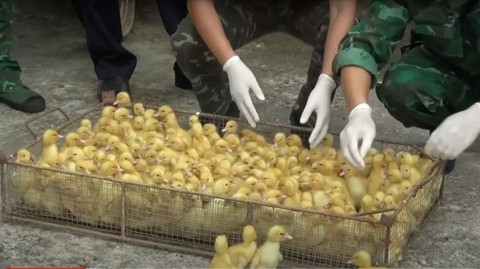
In the first nine months of 2023, Vietnamese authorities discovered 131 cases of smuggled live poultry, an increase of 14.5 times compared to 2022. — Photo nongnghiep.vn
Businesses and small livestock farmers are being severely affected by illegal smuggling of poultry breeds and poultry products into Việt Nam, according to Nguyễn Thanh Sơn, chairman of the Vietnam Poultry Association
Speaking at a conference on preventing the illegal import of cattle and poultry organised by the Ministry of Agriculture and Rural Development in Hà Nội on Tuesday, Sơn said in the past two years, the livestock industry has had to overcome many difficulties due to the market crisis, post-COVID-19 period and geopolitical developments.
“In that context, illegal imports have made the domestic market more difficult," Sơn said.
"Leading enterprises in the association have suffered heavy losses of up to hundreds of billions of đồng."
In the first nine months of 2023, Vietnamese authorities discovered 131 cases of smuggled live poultry, an increase of 14.5 times compared to 2022.
At present, domestic poultry farmers are preparing to supply poultry products for the end of the year, so demand increases.
Smugglers have promoted the illegal imports of poultry breeds to Việt Nam to meet the demand, especially at border gates.
According to the association, the amount of live chickens imported illegally across the border has increased to 200,000 - 250,000 tonnes each year. Every month, tens of thousands of tonnes of chicken are smuggled into Việt Nam.
The smuggling of poultry and cattle has caused diseases and created unfair competition, Sơn said.
Nguyễn Xuân Dương, chairman of the Vietnam Livestock Association, also said that if the illegal imports are not dealt with, it will lead to an outbreak of diseases, as most of the diseases in the domestic livestock industry come from illegally imported poultry and cattle.
The leader of the Vietnam Livestock Association said besides the risk of disease, the consequences of this situation threaten the health of consumers and can cause losses in the domestic market.
This has forced domestic livestock producers to sell their products at lower prices, while the number of imports keeps increasing, especially illegal imports, Dương said.
He has also expressed his concerns about small farmers and farms. They may not be able to collect their capital, and of course not reinvest in production for next year.
The association hopes that the Ministry of Agriculture and Rural Development, ministries, departments and branches will soon have solutions to control the situation and support Việt Nam's livestock industry, Dương said.
Vũ Anh Tuấn, deputy general director of CP Vietnam Livestock JSC, said that the smuggling of poultry breeds is not due to lack of domestic supply, low quality of breeds or high prices, but due to excess supply from other countries. Vietnamese cattle and poultry breeds completely compete with those of other countries in terms of quantity and quality.
Tuấn expects that the directions of the Prime Minister, ministries, and branches, and the active participation of border provinces in strictly controlling the smuggling of livestock products will help farmers to overcome the difficulties, and contribute to the sustainable development of the domestic livestock industry.
Speaking at the conference, Deputy Minister of Agriculture and Rural Development Phùng Đức Tiến said at present, legal documents on the management of production, business, import and export of livestock, and livestock products are complete, the important issue is to carry out effectively those legal documents.
Tiến said that some localities have implemented campaigns to prevent the smuggling of cattle and poultry but they are not regular.
Localities need to implement these campaigns seriously and regularly in accordance with the direction of the Government and the Prime Minister, he said.
Major General Bùi Trọng Thế, deputy director of the Department of Economic Security, the Ministry of Public Security, said that in the future, the police and relevant forces need to strengthen inspections and supervision, and resolutely handle activities of trading unknown-origin animal products. VNS